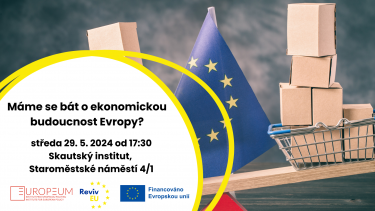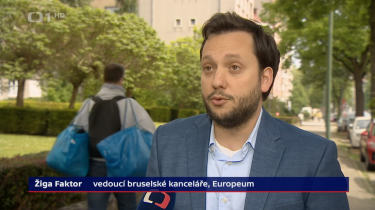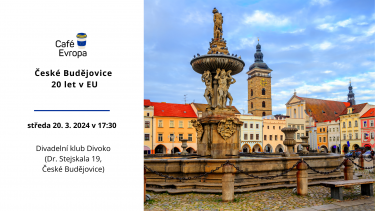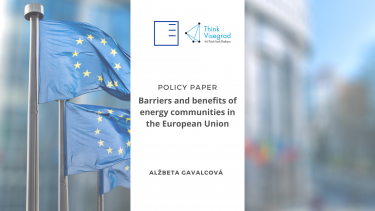RevivEU | Should we fear for the economic future of Europe?
We invite you to a public podcast recording focusing on the discussion of the impacts of the COVID-19 pandemic on European industrial policy and its potential consequences for the Czech economy and society. We will discuss the new technological dynamics resulting from the pandemic and explore ways in which the European Union can respond to technological competition with the USA and China.
Zjistit víceUdálosti | Why is Euroskepticism and the far-right rising in EU elections?
In the forthcoming European elections, projections suggest that the European People's Party and the Socialists will likely hold their ground. However, a competitive scenario arises for the third spot as liberals confront rising of Eurosceptic and far-right parties. What drives voter behavior towards these political parties? Žiga Faktor, deputy director and head of EUROPEUM Institute's Brussels office, answered for main evening broadcast Události at Česká televize.
Zjistit více
Café Evropa: České Budějovice 20 years in EU
We invite you to the next debate of the Café Evropa series. Come and talk to us about what current european issues are resonating in České Budějovice and how you imagine Europe. Are you interested in nuclear energy, electromobility, euro, local projects supported by the EU, culture or any other european topics?
Zjistit vícePolicy Paper | Barriers and benefits of energy communities in the European Union
Energy communities are an effective means to decentralize and renew our energy systems with sustainable solutions as they are usually based on renewable energy. They have already started emerging in 1970´s, yet there has been a significant increase in their development only in recent years, also in terms of their introduction into the EU legislation. Especially in Western and Northern European countries the concept already enjoys vast popularity. On the other hand, in Central and Eastern European countries (further referred to as CEE) energy communities are only beginning to emerge. The policy brief (based on literature and interviews with various stakeholders ) examines the benefits energy communities may bring, and more importantly, the main obstacles remaining in their way for greater evolution in the CEE region – and especially Visegrad countries (V4). As these initiatives progress, sharing the best practices will ensure the success of the community energy in the energy transition. Writes Alžbeta Gavalcová.
Zjistit vícePolicy Paper | Barriers and benefits of energy communities in the European Union
Energetické komunity jsou účinným prostředkem decentralizace a obnovy našich energetických systémů pomocí udržitelných řešení, protože jsou obvykle založeny na obnovitelné energii. Začaly se objevovat již v 70. letech 20. století, avšak k jejich výraznému rozvoji došlo až v posledních letech, a to i z hlediska jejich zavedení do legislativy EU. Zejména v zemích západní a severní Evropy se tato koncepce již těší velké oblibě. Naproti tomu v zemích střední a východní Evropy (dále jen SVE) se energetická společenství teprve začínají vytvářet. Tento politický brief (založený na literatuře a rozhovorech s různými zúčastněnými stranami ) zkoumá výhody, které mohou energetická společenství přinést, a především hlavní překážky, které jim stále stojí v cestě k většímu rozvoji v regionu střední a východní Evropy - a zejména v zemích Visegrádské skupiny (V4). Jak tyto iniciativy postupují, sdílení osvědčených postupů zajistí úspěch komunitní energetiky v energetickém přechodu. Píše Alžbeta Gavalcová.
Zjistit víceČRo Plus | The EU lags behind the US and China due to weak capital strength and new technologies
The European Union economically lags behind the United States of America and China. The recent meeting in Brussels reflected concerns about a slowdown in the EU economy, which entered 2024 with lower-than-expected growth. EUROPEUM Institute analyst Vít Havelka commented on this situation for ČRo Plus.
Zjistit více
RTVS | Extraordinary Summit in Brussels
The extraordinary summit in Brussels is focusing on competitiveness and the EU's strategic agenda, including the strengthening of the single market, Turkey-EU relations, Ukraine and Israel. Žiga Faktor, head of the Brussels office and deputy director of EUROPEUM Institute, commented on this for Slovak RTVS.
Zjistit více
RILSA | The uncertain fate of the Green Deal for Europe ahead of the European Parliament elections
Farmers' protests have reminded that the measures of the Green Deal for Europe may not be politically viable for Europeans. To make climate policies politically viable, the EU should therefore focus on its commitment not to leave anyone behind in the green transition. Klára Votavová, a researcher at EUROPEUM Institute for European Policy, discusses the current development of the Green Deal for Europe and its social policy aspects in an expert publication for the Social Policy Forum.
Zjistit víceiRozhlas.cz | Fossil fuel boilers are not banned by the European Union
The information about an EU-wide ban on gas and coal boilers, that has been recently circulating on social media, is not true. The aim of the new European directive is not to ban them, but to promote the phasing out of these boilers in line with the 2050 carbon neutrality targets. Viktor Daněk, deputy director of the EUROPEUM Institute, described the nature of the directive to the iROZHLAS.cz project Ověřovna.
Zjistit víceČRo Plus | First World Nuclear Energy Summit in Belgium
The first Nuclear Energy Summit was held in Belgium with over 40 countries in attendance. Their deputies discussed the future of nuclear energy, not only in Europe, but also worldwide. Žiga Faktor, head of EUROPEUM's Brussels office, commented on the conclusion of this event in Brussels for Czech Radio Plus.
Zjistit více
Staroměstské náměstí 4/1
Praha 1 - Staré Město
110 00
tel.: +420 212 246 552
email: europeum@europeum.org
https://www.europeum.org








